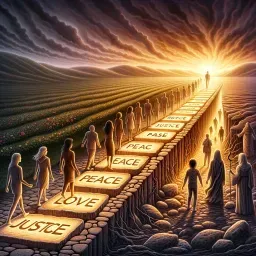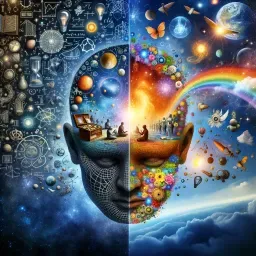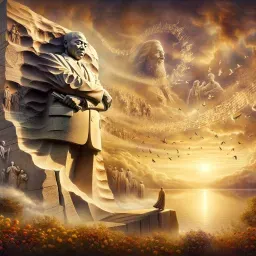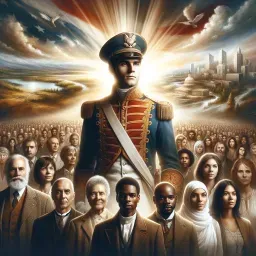”Man is condemned to be free;
because once thrown into the world, he is responsible for everything he does“

0
0
0
0
- Meaning
- This quote from Sartre essentially captures the essence of existentialist philosophy. Here, Sartre expresses the idea that man is "condemned" to freedom in the sense that he cannot escape the responsibility for his own choices and actions. Once thrown into the world (i.e., born), each individual becomes entirely responsible for everything they do. This concept implies that, although humans may feel oppressed by the idea of their own freedom, it is inescapable. The essence of being human is not predetermined; we create ourselves through our choices.
- Allegory
- The individual at the crossroads represents the human being faced with the countless choices in life. The uncultivated land symbolizes the blank slate upon which we build our existence, while the diverging roads illustrate the different possibilities we can explore. The backpack symbolizes our responsibilities and the weight of our decisions. The starry sky above, with its infinite stars, represents the numerous opportunities and the vast field of freedom. The mountains and valleys on the horizon embody future challenges and opportunities. The larger shadow of the self beside them reflects the internal complexity and existential anguish that accompanies the awareness of one's freedom. The colors used in the scene, from the blue of the night to the green and brown of the landscape, send a message of hope and introspection, evoking human responsibility and introspection throughout the entire image.
- Applicability
- In daily life, this teaching can be applied by recognizing that each of us has the power and responsibility for our own actions. Rather than blaming external factors or contingencies for our failures or mistakes, we must accept that we are the architects of our own destiny. This awareness can help to live a more authentic and meaningful life, making choices that reflect our deepest values and aspirations.
- Impact
- This quote has had a profound impact on 20th-century philosophy and popular culture. It has influenced not only other philosophers and thinkers but also literature, art, and cinema. The concept of absolute responsibility of the individual has fueled discussions and debates on freedom, morality, and the essence of human existence. It is often cited in academic and literary contexts to illustrate the main ideas of existentialism.
- Historical Context
- The phrase was coined in 1943, during World War II. This historical context had a significant influence on Sartre and his philosophy. The Nazi occupation of France and the existential crisis of the period shaped his view of freedom and individual responsibility.
- Criticisms
- Some critiques of Sartre's quote come from those who believe that the idea of complete individual freedom is unrealistic, as it ignores the social, economic, and psychological factors that influence people's decisions. Another critique is that this total responsibility could lead to a state of anguish or decision paralysis. Arguments against this view may assert that circumstances and external conditions also play a significant role in determining the course of a person's life.
- Variations
- There are no significant variations or directly related interpretations from other cultures concerning Sartre's specific quote. However, many philosophical traditions, both Western and Eastern, explore similar themes regarding individual responsibility and the nature of freedom. For example, Eastern philosophies like Buddhism tend to emphasize awareness and intentional action, but in a more collective and harmonious context compared to Sartre's radical individualism.
-

That which does not kill me makes me stronger.
-

Every journey begins with a single step.
-

The road to hell is paved with good intentions.
-

With great power comes great responsibility.
-

Imagination is more important than knowledge.
-

Even the darkest night will end, and the sun will rise.
-

Do not impose on others what you do not wish for yourself.
-

What we do in life echoes in eternity.
-

Life is the sum of all your choices.
-

The true test of a man's honor is his loyalty to his country.
No Comments